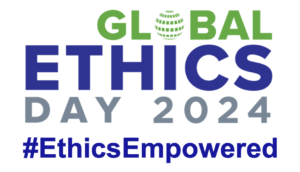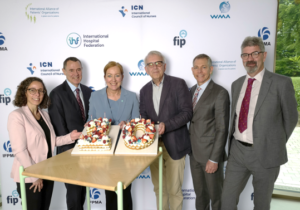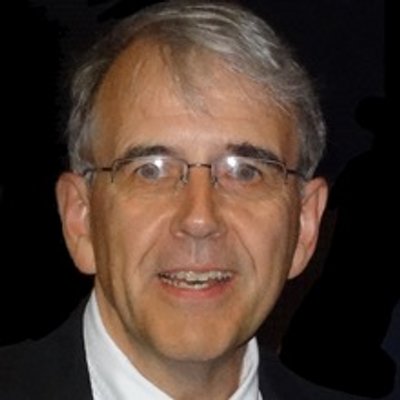Celebrating a decade of ethical collaboration: An international consensus of healthcare leaders looks to the future
by Dr Otmar Kloiber and joint authors, listed below.
Ten years ago, global health leaders came together to agree the first-of-its-kind international Consensus Framework for ethical collaboration between patients’ organizations, healthcare professionals, and the pharmaceutical industry in support of quality patient care. Since then, the Framework has been adopted across countries worldwide and embedded in international initiatives.
This Global Ethics Day, under the theme ‘Ethics Empowered’, members of the international Consensus Framework celebrate 10 years of the Framework as a lighthouse for ethical collaboration for the benefit of patients. In this joint op-ed, members reflect on progress made under the Framework over the last decade and announce their commitment to ensuring it is fit-for-purpose to address unfolding new realities, including the impact of new innovations, on patients’ lives.
The very first Global Ethics Day was celebrated one decade ago. This milestone of development in the ethics world was engineered for the express purpose of raising awareness and driving diverse stakeholders to address the ethics issues facing their organizations and society.
It is fitting that, in this same year, entities representing the world’s patients, healthcare professionals, hospitals, and the pharmaceutical manufacturing industry also came together to forge a novel commitment; an international Consensus Framework to foster ethical collaboration.
One decade later, on this 2024 Global Ethics Day, we are thrilled to share not only the progress we have made together but also our collective ambitions for the future. A future that must find ethical collaboration at the heart of every major practice determined and of every decision taken in healthcare leadership.

Our journey began with recognition that health systems around the world were evolving, and continue to evolve, in favor of more dynamic partnerships. Partnerships that require leading actors with one common purpose – to advance patient health – to trust in each other as they realize this purpose. The COVID-19 pandemic was one of several major health developments that has further propelled this evolution.
But for such partnerships to uphold trust, especially in human health, it also became imperative to see ethics-focused partnership unfold at the highest levels. For this, a new transnational platform was needed to represent a shared commitment to sustain fundamental ethical principles, and to create a safe space to raise ethical risks or opportunities for collective input and alignment to deliver greater patient benefits and support high quality care.
The six international member bodies of the Framework – International Alliance of Patients’ Organizations, International Council of Nurses, International Hospital Federation, International Pharmaceutical Federation, the World Medical Association, and the International Federation of Pharmaceutical Manufacturers and Associations – have collaborated on numerous ethics issues in diverse formats, co-creating several notes for guidance as well as providing bilateral and multilateral input on emerging ethical considerations afflicting one or more bodies. In so doing, we utilized the Framework to enshrine four overarching principles:
- Putting patients first
- Supporting ethical research and innovation
- Ensuring independence and ethical conduct
- Promoting transparency and accountability.
At the same time, we used the Framework to bring outside perspectives into our work and share our expertise with others to advance ethical decision-making in health.
The value of this innovation in process and design cannot be understated. In fact, the salience of this approach at the international level became truly apparent in 2016 when Canada and Peru became the first countries to adopt national-level, consensus-based frameworks spanning major local health stakeholders. From 2017 to 2024, twelve additional national-level frameworks were adopted among leading health bodies in countries as diverse as China and the United States, Kenya and Japan, Brazil and New Zealand, underscoring that a fundamental need has surfaced in favor of ethical collaboration, irrespective of a nation’s health system.
Many countries saw their framework membership expand as time progressed, drawing new voices to the “table” to advance ethical collaboration in their healthcare systems. With the approach under active consideration in many other countries today, leading international institutions from the Asia-Pacific Economic Cooperation Forum (APEC) to the United Nations and the Organization for Economic Co-operation and Development (OECD) have taken notice. And several governments, such as those in Chile and Australia, have stepped up in support of their framework process.
The theme of this year’s Global Ethics Day is Ethics Empowered, and we believe our international Consensus Framework has done precisely this. This is true both for us and for the hundreds of health bodies across the globe participating in consensus frameworks who, in turn, represent tens of thousands of companies, millions of healthcare leaders and caregivers, and billions of patients.
 As we celebrate the ten-year milestone of the international Consensus Framework for Ethical Collaboration in health, it is also crucial to acknowledge the evolving challenges that today’s healthcare sector faces. For this reason, we look boldly to the future.
As we celebrate the ten-year milestone of the international Consensus Framework for Ethical Collaboration in health, it is also crucial to acknowledge the evolving challenges that today’s healthcare sector faces. For this reason, we look boldly to the future.
The rapid rise of digital platforms and the production and use of health data, including the expansion of artificial intelligence (AI) capabilities, is transforming how each of our bodies and those we represent approach healthcare delivery and patient care.
These innovations offer tremendous potential as well as pose new ethical dilemmas. The Framework, in its current form, provides a solid foundation, but we are looking to address emerging needs through the inclusion of an additional ethical principle. If successful, such an outcome would mark the first time leading health stakeholders have come together to advance ethical collaboration in health data and AI. We are showing that ethical collaboration needs to continuously adapt to meet evolving societal expectations.
We could not be prouder to celebrate Global Ethics Day by reaffirming our commitment to the Framework and its principles. The power of ethical collaboration is, and always will be, our greatest tool for building better healthcare.
Joint authors with Dr Otmar Kloiber:
- Dani Mothci, CEO, International Alliance of Patients’ Organizations (IAPO)
- Howard Catton, Chief Executive Officer, International Council of Nurses (ICN)
- Ronald Lavater, CEO, International Hospital Federation (IHF)
- Dr Catherine Duggan, CEO, International Pharmaceutical Federation (FIP)
- David Reddy, Director General, International Federation of Pharmaceutical Manufacturers and Associations (IFPMA)

